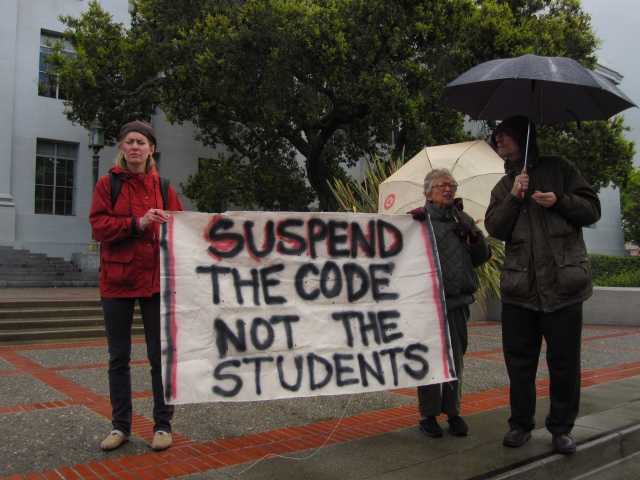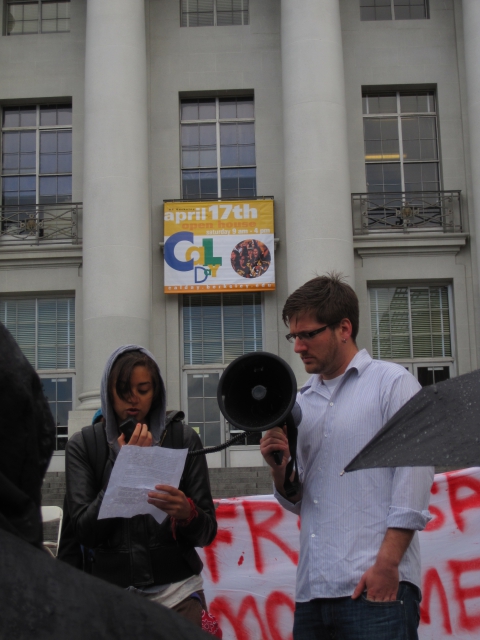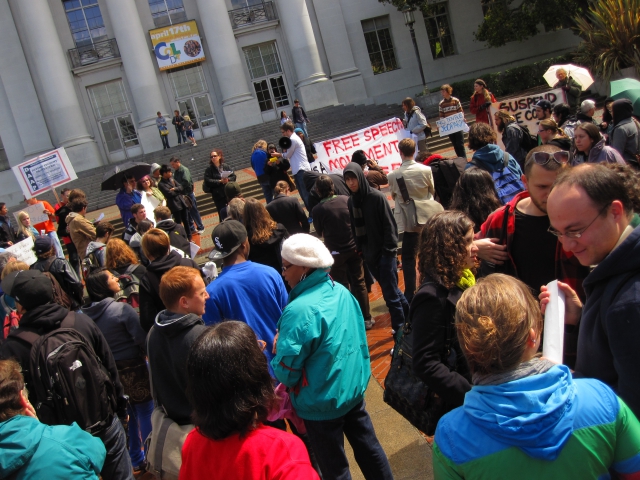From the Open-Publishing Calendar
From the Open-Publishing Newswire
Indybay Feature
UC Berkeley students fight crackdown on protests
On Monday, April 5, dozens rallied at UC Berkeley to protest the university's crackdown on student protests. Over 100 students are facing possible suspension for participating in last semester's protests against budget cuts, furloughs, and tuition hikes.
The Center for Student Conduct and Community Standards - the office responsible for enforcing the university's code of conduct - is charging students arrested in last year's protests of violating the code. More than 100 students are being charged, including participants in last November's occupation of Wheeler Hall and last December's Open University. The center is offering students "informal resolutions" to their cases, which would require them to write an essay and to accept suspension for the 2010 summer and fall semesters.
Students say that the essay would force them to admit wrongdoing and expose fellow protesters to further punitive action. Many students claim that the two-semester suspension would create severe hardships for students and would have a chilling effect on dissent at UC Berkeley.
Elaine Eller, a Berkeley undergraduate and one of the students being charged for protesting, said that the suspension would force her to miss an entire year of school. Eller takes language courses that run through the fall and spring semesters, and a fall suspension would mean that she would have to miss the spring semester as well.
Neil Satterlund, a law student who is advising students facing charges, said that graduate students who are suspended would lose their funding and would essentially be fired from their university jobs.
Law student Daniela Urban called the suspensions an "unparalleled sanction" that sets a very aggressive standard for the university's response to student protest. She said, "If this is their jumping off point, what will students say to that? I've done nothing wrong and you haven't shown I've done anything wrong."
Most students are planning to decline the university's offer of an informal resolution and to contest the charges in formal disciplinary hearings. The first protest-related hearings are scheduled for May 7.
Disciplinary Proceedings Violate Students' Rights
Students are also criticizing the university's code of conduct for violating their rights, including that of due process. University administrators say that the campus' disciplinary process is designed to be "educational" and "developmental." But critics say that the code fails to protect student rights while allowing for serious sanctions.
In December, two students arrested in a protest at Chancellor Robert Birgeneau's residence were handed interim suspensions that prohibited them from communicating with members of the university community. And in one of the cases, the university attempted to have the student evicted from her university-owned apartment.
At a forum with university administrators held in February, law student Daniela Urban called the code of conduct procedures a "quasi-judicial process without the protections of an actual judicial process."
Urban and other law students formed the Campus Rights Project, an initiative aimed to ensure that the university respect students' due process rights in student conduct proceedings. The Campus Rights Project has observed numerous violations of students' rights, including the university's refusal to produce evidence used against students, students being tried without adequate notice, and students being denied representation at formal hearings.
At the forum, other students criticized the university for charging and disciplining students based on flimsy evidence. In one instance, a student was charged on the basis of a university press release that named the student as having been arrested at a protest. In other instances, students were accused of violations beyond those alleged by campus police.
Carmen Comsti, a member of the Campus Rights Project who has been advising students through the disciplinary proceedings, told us that some students were being charged based on the university's belief that they could get the student or other protest participants to incriminate themselves. "Conduct officers have said that despite the fact they don't have evidence, they want to pursue the charges because they feel the students themselves will provide the evidence," Comsti said.
Students also pointed out that even the university's flawed code was not being followed and was not being made available to advocates. Speaking in February, Comsti told us, "We don't know what the standards are at this point. The university is using the code to drag out the process and instill fear in students for participating in protest and criticism."
University administrators acknowledged that the code's timeline had been suspended because of furloughs and that the code had been temporarily removed from the universty's website for legal review.
Students say that the essay would force them to admit wrongdoing and expose fellow protesters to further punitive action. Many students claim that the two-semester suspension would create severe hardships for students and would have a chilling effect on dissent at UC Berkeley.
Elaine Eller, a Berkeley undergraduate and one of the students being charged for protesting, said that the suspension would force her to miss an entire year of school. Eller takes language courses that run through the fall and spring semesters, and a fall suspension would mean that she would have to miss the spring semester as well.
Neil Satterlund, a law student who is advising students facing charges, said that graduate students who are suspended would lose their funding and would essentially be fired from their university jobs.
Law student Daniela Urban called the suspensions an "unparalleled sanction" that sets a very aggressive standard for the university's response to student protest. She said, "If this is their jumping off point, what will students say to that? I've done nothing wrong and you haven't shown I've done anything wrong."
Most students are planning to decline the university's offer of an informal resolution and to contest the charges in formal disciplinary hearings. The first protest-related hearings are scheduled for May 7.
Disciplinary Proceedings Violate Students' Rights
Students are also criticizing the university's code of conduct for violating their rights, including that of due process. University administrators say that the campus' disciplinary process is designed to be "educational" and "developmental." But critics say that the code fails to protect student rights while allowing for serious sanctions.
In December, two students arrested in a protest at Chancellor Robert Birgeneau's residence were handed interim suspensions that prohibited them from communicating with members of the university community. And in one of the cases, the university attempted to have the student evicted from her university-owned apartment.
At a forum with university administrators held in February, law student Daniela Urban called the code of conduct procedures a "quasi-judicial process without the protections of an actual judicial process."
Urban and other law students formed the Campus Rights Project, an initiative aimed to ensure that the university respect students' due process rights in student conduct proceedings. The Campus Rights Project has observed numerous violations of students' rights, including the university's refusal to produce evidence used against students, students being tried without adequate notice, and students being denied representation at formal hearings.
At the forum, other students criticized the university for charging and disciplining students based on flimsy evidence. In one instance, a student was charged on the basis of a university press release that named the student as having been arrested at a protest. In other instances, students were accused of violations beyond those alleged by campus police.
Carmen Comsti, a member of the Campus Rights Project who has been advising students through the disciplinary proceedings, told us that some students were being charged based on the university's belief that they could get the student or other protest participants to incriminate themselves. "Conduct officers have said that despite the fact they don't have evidence, they want to pursue the charges because they feel the students themselves will provide the evidence," Comsti said.
Students also pointed out that even the university's flawed code was not being followed and was not being made available to advocates. Speaking in February, Comsti told us, "We don't know what the standards are at this point. The university is using the code to drag out the process and instill fear in students for participating in protest and criticism."
University administrators acknowledged that the code's timeline had been suspended because of furloughs and that the code had been temporarily removed from the universty's website for legal review.
We are 100% volunteer and depend on your participation to sustain our efforts!
Get Involved
If you'd like to help with maintaining or developing the website, contact us.
Publish
Publish your stories and upcoming events on Indybay.
Topics
More
Search Indybay's Archives
Advanced Search
►
▼
IMC Network





